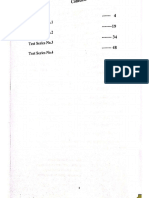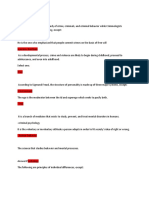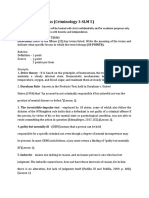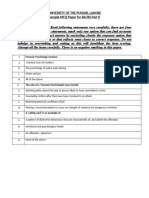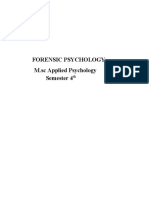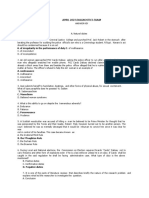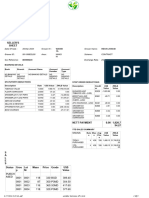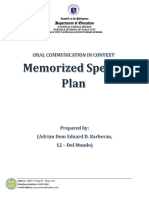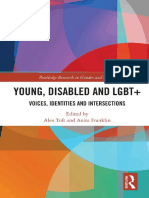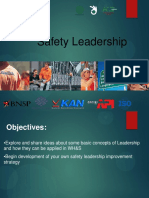QUESTION 1: Discuss any FIVE roles of criminal psychology.
[25 MARKS]
Profiling:
Developing offender profiles to aid investigations.
Analyzing behavioral patterns and crime scene characteristics.
Expert Testimony:
Providing expert opinions in court.
Explaining psychological assessments and findings to judges and juries.
Assessment and Evaluation:
Conducting mental health evaluations of offenders.
Assessing competency to stand trial and risk of reoffending.
Therapeutic Interventions:
Providing therapy to offenders to address psychological issues.
Developing rehabilitation programs for convicted individuals.
Research and Prevention:
Conducting research on the psychological factors of criminal behavior.
Developing strategies and programs to prevent crime.
QUESTION 2: Describe the FOUR roles performed by psychologists upon being
professionally involved in criminal proceedings. [25 MARKS]
Clinical Assessment:
Evaluating mental health status of defendants.
Diagnosing psychological disorders relevant to the case.
Risk Assessment:
Assessing the risk of future violent behavior or reoffending.
Providing recommendations for sentencing based on risk factors.
Consultation:
Collaborating with law enforcement and legal professionals.
Advising on interviewing techniques and interrogation strategies.
Expert Witness Testimony:
Presenting findings from psychological evaluations in court.
Educating the court on the psychological impact of crime.
QUESTION 3: Discuss the role of peer influence in youth crime. [25 MARKS]
Social Learning:
�Young individuals may imitate behaviors of their peers.
Exposure to delinquent behaviors can normalize criminal activities.
Group Dynamics:
Peer pressure can compel individuals to commit crimes to gain acceptance.
Loyalty to the group may overshadow personal moral beliefs.
Risk-Taking Behavior:
Adolescents are more prone to risk-taking in groups.
Engaging in criminal activities may seem more appealing in a peer setting.
Support Networks:
Peers may provide emotional or logistical support for criminal endeavors.
Youth may feel emboldened to act due to perceived support from friends.
Identity Formation:
Association with delinquent peers can shape identity and self-perception.
Youth may adopt criminal behavior as part of their social identity.
QUESTION 4: Explain the symptoms of Schizophrenia and Psychotic disorders. [25
MARKS]
Hallucinations:
Experiencing sensory perceptions without external stimuli (e.g., hearing voices).
Can affect all senses; auditory hallucinations are most common.
Delusions:
Strongly held false beliefs resistant to contrary evidence.
Common types include paranoid delusions, grandiosity, and reference.
Disorganized Thinking:
Incoherent speech and difficulty organizing thoughts.
Statements may lack logical progression, impacting communication.
Negative Symptoms:
Diminished emotional expression (flat affect).
Lack of motivation, social withdrawal, and neglect of personal hygiene.
Cognitive Impairments:
Issues with memory, attention, and executive functioning.
Difficulties in planning, decision-making, and problem-solving.
QUESTION 5: Discuss the major premises of the Motivational theory and the Freud’s
psycho-analytical theory. [25 MARKS]
�Motivational Theory:
Focuses on understanding behaviors driven by intrinsic and extrinsic motivations.
Highlights the role of needs and desires in shaping human behavior.
Maslow’s Hierarchy of Needs:
Proposes a five-tier model of human needs (physiological to self-actualization).
Suggests that unmet lower-level needs hinder the pursuit of higher-level goals.
Incentive Motivation:
Behavior is influenced by anticipated rewards and punishments.
Individuals are motivated to pursue goals that yield positive outcomes.
**Self-
Determination Theory:
- Emphasizes the importance of autonomy, competence, and relatedness.
- Suggests that intrinsic motivation leads to better performance and well-being.
5. Freud’s Psycho-analytical Theory:
- Centers on the unconscious mind and its influence on behavior.
- Proposes that childhood experiences shape personality and influence adult
behavior.
---
QUESTION 6: Examine any FIVE factors that affect an eyewitness testimony. [25
MARKS]
1. Memory Distortion:
- Reconstructing memories can lead to inaccuracies.
- Factors like leading questions can alter recollection.
2. Stress and Trauma:
- High-stress situations can impair memory formation.
- Trauma can affect clarity and reliability of the testimony.
3. Duration of Exposure:
- Length of time spent observing an event impacts recall accuracy.
- Brief encounters may lead to incomplete or mistaken identifications.
4. Cognitive Dissonance:
- Conflicting information or doubts can affect a witness’s confidence.
- Witnesses may adjust their memories to align with new evidence or feedback.
5. Bias and Stereotyping:
- Preexisting biases can influence interpretation of events.
- Racial and social stereotypes may affect identifications and descriptions.





